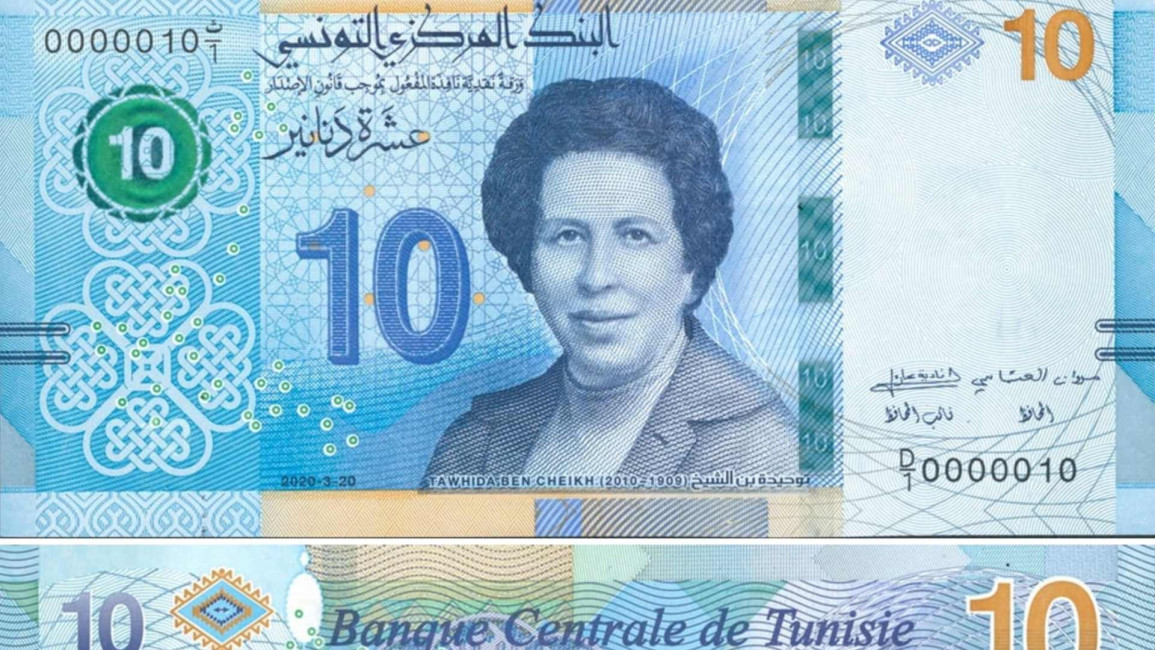Tunisia's groundbreaking first woman doctor honoured on new banknote
Tunisia's groundbreaking first woman doctor honoured on new banknote
The late Doctor Tawhida Ben Cheikh has become on of the few women in the world to feature on a banknote.
2 min read
Tawhida Ben Cheikh was the first woman doctor in North Africa [Central Bank of Tunisia]
Tunisia on Friday issued a banknote honouring the country's first woman doctor, Tawhida Ben Cheikh.
Abdelaziz bin Said, director of the public treasury of the Central Bank of Tunisia, said it was decided a year ago to dedicate the new 10 dinar ($3.5) note to the doctor and to "honour Tunisian women".
The release of the new banknote into circulation on Friday also comes at an opportune time to honour medical professionals who are at the frontline in Tunisia's fight against the novel coronavirus, Bin Said said.
Ben Cheikh broke a number of boundaries for women in the North African country.
In 1928, she became the first woman to attain a high-school baccalaureate. She then went on to study medicine in Paris, reportedly becoming the first female doctor of modern medicine in North Africa and perhaps the wider region.
Ben Cheikh eventually specialised in gynecology and headed campaigns around access to contraception and abortion.
Those efforts led to the legalisation of abortion in 1965, but only for married women with more than five children who had the approval of their husband. Just eight years later, Tunisia gave all women access to abortion within the first trimester, regardless of their partner's approval.
A 2017 study estimated only 15 percent of the world's banknotes feature women.
The United Kingdom for example has featured just three women on banknotes, none of them concurrently. Currently author Jane Austen appears on the £10 ($12.50) note. Queen Elizabeth II does feature on the back of every note, however.
Ben Cheikh will not be the first woman to appear on a banknote in the Arab world.
The doctor replaces Dido, also known as Queen Elissa, on the 10 dinar note. According to Greek and Roman sources, Dido was the founder and first queen of Carthage, a Phoenician empire which span across the Mediterranean from modern-day Tunisia.
Syria's 500 pound ($0.97) note features Queen Zenobia, a third century queen of the Palmyrene Empire who led a revolt against the Roman Empire.
Follow us on Facebook, Twitter and Instagram to stay connected.
Abdelaziz bin Said, director of the public treasury of the Central Bank of Tunisia, said it was decided a year ago to dedicate the new 10 dinar ($3.5) note to the doctor and to "honour Tunisian women".
The release of the new banknote into circulation on Friday also comes at an opportune time to honour medical professionals who are at the frontline in Tunisia's fight against the novel coronavirus, Bin Said said.
Ben Cheikh broke a number of boundaries for women in the North African country.
In 1928, she became the first woman to attain a high-school baccalaureate. She then went on to study medicine in Paris, reportedly becoming the first female doctor of modern medicine in North Africa and perhaps the wider region.
Ben Cheikh eventually specialised in gynecology and headed campaigns around access to contraception and abortion.
Those efforts led to the legalisation of abortion in 1965, but only for married women with more than five children who had the approval of their husband. Just eight years later, Tunisia gave all women access to abortion within the first trimester, regardless of their partner's approval.
She was the first female doctor to sit on the National Council of the Order of Physicians of Tunisia. Ben Cheikh also served as Vice President of the Tunisian Red Crescent and founded Tunisia's first family planning clinic.
The esteemed doctor passed away at the age of 101 in December 2010. |
| [Central Bank of Tunisia] |
A 2017 study estimated only 15 percent of the world's banknotes feature women.
The United Kingdom for example has featured just three women on banknotes, none of them concurrently. Currently author Jane Austen appears on the £10 ($12.50) note. Queen Elizabeth II does feature on the back of every note, however.
Ben Cheikh will not be the first woman to appear on a banknote in the Arab world.
The doctor replaces Dido, also known as Queen Elissa, on the 10 dinar note. According to Greek and Roman sources, Dido was the founder and first queen of Carthage, a Phoenician empire which span across the Mediterranean from modern-day Tunisia.
Syria's 500 pound ($0.97) note features Queen Zenobia, a third century queen of the Palmyrene Empire who led a revolt against the Roman Empire.
Follow us on Facebook, Twitter and Instagram to stay connected.


![President Pezeshkian has denounced Israel's attacks on Lebanon [Getty]](/sites/default/files/styles/image_684x385/public/2173482924.jpeg?h=a5f2f23a&itok=q3evVtko)



 Follow the Middle East's top stories in English at The New Arab on Google News
Follow the Middle East's top stories in English at The New Arab on Google News


